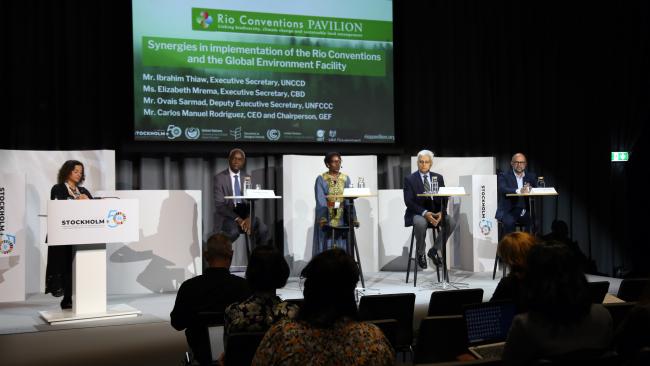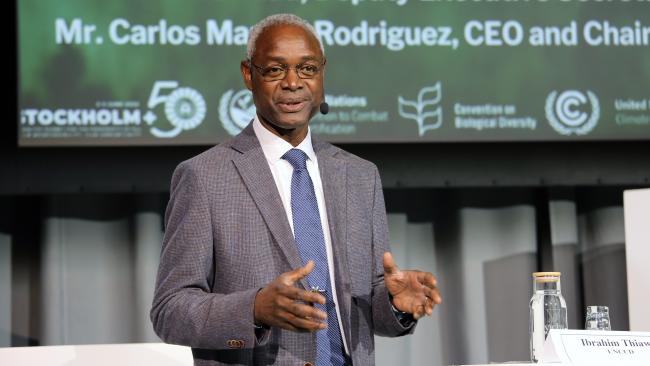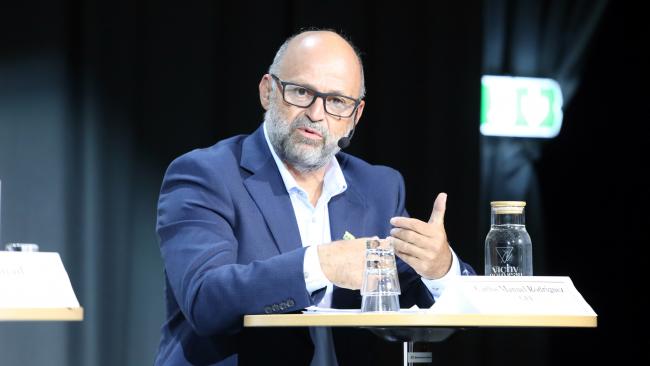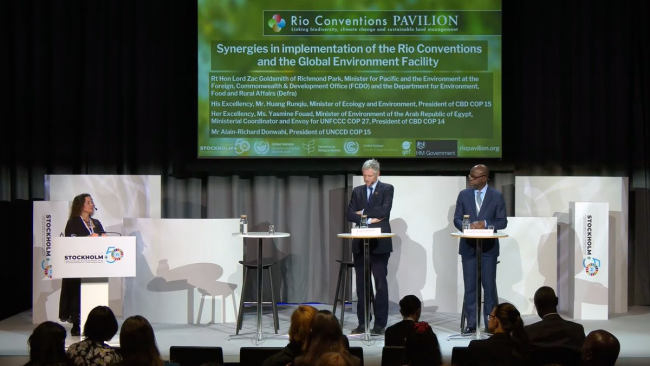About
Synergies and collaboration between the UNFCCC, the CBD and the UNCCD are happening at the Secretariat level and need to be expanded at the country level.
This side event emphasized the importance of integrated approaches in the implementation of the Rio Conventions, with support from the Global Environment Facility (GEF).
Key messages from the event include:
- Implementation of one of the Rio Conventions is implementation of all three: UN Framework Convention on Climate Change (UNFCCC), UN Convention to Combat Desertification (UNCCD), and Convention on Biological Diversity (CBD).
- Synergies and collaboration are happening at the Secretariat level and need to be expanded at the country level.
- The COVID-19 pandemic demonstrated that we know how to respond to crises, but now we need the political will and finance to respond to the triple planetary crisis and prevent a looming loss of life on a totally different scale.
The first panel discussed synergies in implementation of the Rio Conventions and the GEF.
Ibrahim Thiaw, Executive Secretary, UNCCD, said that we only have one planet, and we need to focus on people, their livelihoods, and their relationship with land and the environment. While there are different ministries and difference conventions, he added, we all need to work together as one.
Elizabeth Mrema, Executive Secretary, CBD, said we cannot solve climate change without also solving biodiversity loss and land degradation: the solution to one will contribute to implementing the Rio Conventions and the Sustainable Development Goals (SDGs).
Ovais Sarmad, Deputy Executive Secretary, UNFCCC, cited the excellent coordination between the three conventions, but noted that this is not enough. It is time to break down silos and harness the potential for greater coordinated action at the national level, he added, including the involvement of all stakeholders.
Carlos Manuel Rodgriquez, CEO and Chairperson, GEF, noted he was a youth delegate from Costa Rica at the 1992 Earth Summit and now has 32 COPs under his belt. He noted progress is possible with coherence and integration. The GEF is part of this integration, but for better impact at the country level, we have to work across sectors.
In the interactive discussion, Sarmad said that UNFCCC COP 26 was a milestone for the Paris Agreement and now it is time for COP 27—the implementation COP—where work will begin on the Global Stocktake. He said that the focus will be on mitigation, finance, and loss and damage.
Mrema noted that the post-2020 global biodiversity framework (GBF) will be universal and implemented by all countries, while addressing concerns of all conventions, not just the Rio Conventions. She called on all conventions to align with the future GBF.
Thiaw said that the world has never had so much science and knowledge as we have today, and we need greater integration going forward; the silo approach is not working. Effective land management contributes to the Paris Agreement and the GBF, with the support of the GEF, he noted.
Rodriguez said the USD 5.3 billion GEF replenishment is the largest ever, but still a small drop in the bucket compared to what is needed. Nevertheless, this funding can be powerful if it leverages the necessary action.
In the second panel, the presidencies of the three conventions presented thoughts and plans for cooperation and synergies.
Lord Zac Goldsmith, Minister for Pacific and the Environment, UK, UNFCCC COP 26 Presidency, said a good climate COP should have a positive impact on the other COPs. Nothing is more important than restoring our relationship with nature and having the finance to ensure we do not lower ambitions, he added.
In a video statement, Huang Runqiu, Minister of Ecology and Environment, China, CBD COP 15 President, described how China is addressing the interlinkages between the three Rio Conventions, including through the transformation of deserts, species restoration, and reduction in energy use and carbon emissions.
Alain-Richard Donwahi, Côte d’Ivoire, UNCCD COP 15 President, said when there is urgency, governments have funds to buy weapons for defense and national security, but we also need urgent action for the security of the planet. To save the planet, we have to have high level support to move from talking to action, he added.
In concluding remarks, Moderator Pamela Chasek, noted “The pieces are here. Now, is the time for action, and I think with what we have heard that maybe we're ready to make that pivot.”
Contact person:
David Ainsworth | david.ainsworth@un.org
More information:
To receive free coverage of global environmental events delivered to your inbox, subscribe to the ENB Update newsletter.









